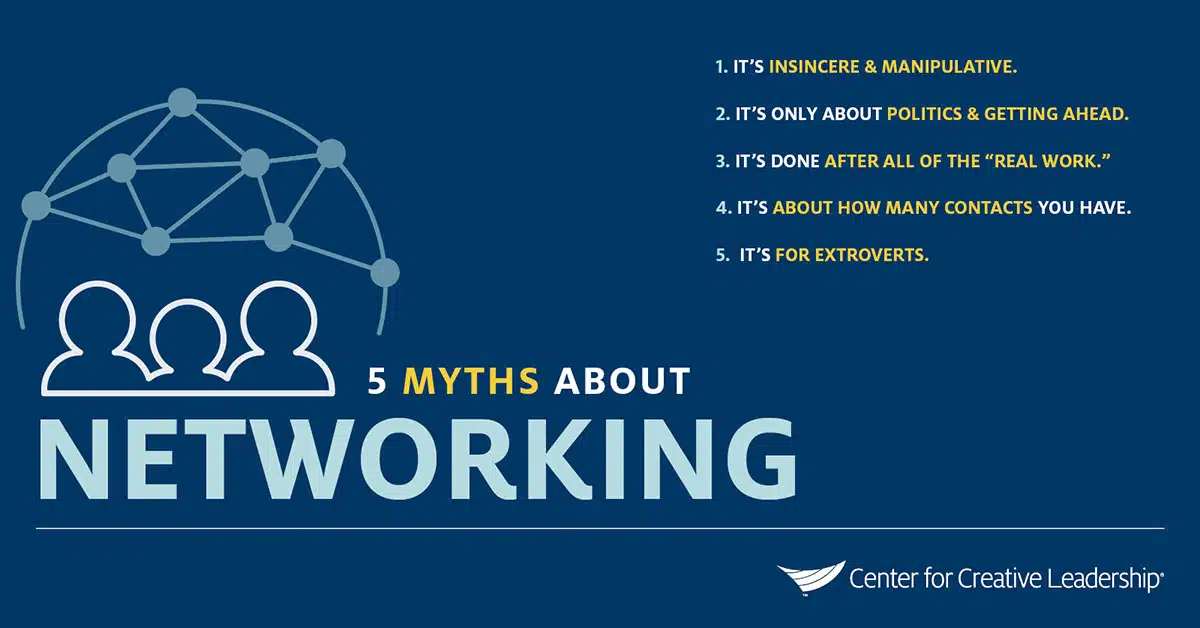Don’t Fall for These Common Myths About Networking
A woman in one of our leadership programs bristled at the idea of strategic networking.
“It’s self-serving and political — and not who I am,” she said.
She isn’t alone in her reaction. Many women in our leadership programs tell us they resist networking. The problem is, a network left to chance isn’t the network you need to advance your career.
Ignoring networks can damage or limit your career and leadership effectiveness — and this is true for both men and women. The right relationships and ties are known to be an asset in getting access to information, earning promotions, and gaining opportunities.
Having the right network is a real differentiator — and it’s not about the number of contacts or connections you have. High-quality networks are open and varied, with people who don’t all know each other. They are diverse, crossing critical boundaries. And core relationships are deep, trusting, and mutually beneficial.
A McKinsey study found that 50% of a company’s intellectual capital is a “relational asset” and 75% of individual capital is their relationships. And leaders with the right kinds of networks are likely to be high performers.
Even though many professional women understand the value in making connections and having political skill, women networking with others can still be a struggling point.
It may be that women are hardwired toward deeper, more personal connections, so transactional relationships feel insincere, according to the thinking of some evolutionary biologists.
But regardless, if networking goes against your natural tendencies, you have some work to do. Here are our tips on networking for women — and men — who struggle with it.
Women’s Networking Tips: 5 Ways to Build a Network
Strengthen Your Networking Skills
Just as relationships can be learned, so can the skills needed to strengthen your network. All are developed based on the concept that executives at any level must change the way they lead others by growing relationships. Here are our networking tips:
1. Don’t fall for the common myths about networking.
What negative — and false — ideas do you hold about networking? First, realize that creating the right network is not about maintaining a big, expansive network or about schmoozing. You may be falling for one of these 5 common myths about networking:
- MYTH: Networking is insincere and manipulative.
- MYTH: Networking is only about politics and getting ahead.
- MYTH: Networking is done when all of the “real work” is done.
- MYTH: Networking is about how many contacts you have.
- MYTH: Networking is for extroverts.
2. Understand your network structure.
Take time to list or map out your network. To get a clear picture of your network, take a piece of paper and draw a circle in the middle. Write your name in the circle. Then write down the names of people with whom you have strong connections — put them close to your circle. Write the names of those with whom you have weak or distant ties farther away from your circle. Finally, ask yourself who should be in your network? Place them (either by name or role) farthest out on your paper.
Then look for patterns in your connections. Are your close ties limited by location or function? Who knows the people you want to know? Are relationships operational, personal, or strategic? Close or distant? Trusting and mutually beneficial? Superficial and one-sided? Vertically diverse? Is your network heavy with people who are similar to you or to each other? Do they all know each other? Is your network outdated, just because it’s easier to avoid networking? The first step is to understand your network’s strengths and weaknesses.
With this insight, you can strategically ask for introductions or find other ways to meet or work with key people. Learn why this network perspective is imperative for leaders.
3. Think in terms of resources.
Identify what resources you need to do your job, have influence, and advance your career. You need a network of champions — mentors and sponsors to help you forge a path and position you for opportunities. Who in your network has those resources? What resources do you need access to, but have no one in your network to help you obtain? Start with what you need most from your network right now. Then consider what you will need down the road.
One tip: for women networking, finding a sponsor — a senior leader with influence who will advocate for a promotion — is critical, but finding one can be a challenge. Download our free mentoring resources to help you find, or become, a mentor or sponsor.
4. Connect with others authentically.
Read the situation and really listen. Networking is really just about connecting with the right people so you have a greater insight — and greater say. Politically astute managers find that by being honest and sincere in their relationships and requests, they inspire others to trust and have confidence in them.
Also, be a perceptive observer. Social astuteness — the ability to read and anticipate situations — allows you to prepare, adapt, and tailor your behavior based on the people and conditions around you. One way to boost your powers of observation is to pay attention to the nonverbal behaviors of the people around you. In your next meeting, try to get a sense for how people are feeling in addition to what they are saying. This idea applies to virtual meetings as well, but rather than watching, you’ll want to observe by listening.
Go beyond active listening to really hear and listen to understand where others are coming from.
Seek advice and let others know their input is important to you. Any relationship involves learning from other people and listening to what they have to offer, and doing so sincerely is critical for authentic leadership.
Asking for feedback is critical in building a network. If other team members feel as though you don’t care to hear their thoughts, then they won’t offer input when you really need their expertise. Seek honest answers from your peers. Ask for earnest, straightforward feedback from your superiors. Again, however, those conversations come only by building a good relationship. To keep track of how you’re doing, do this on a regular basis.
Ask directly for networking tips from colleagues and superiors. How do they advise you expand your network? See if you can get honest feedback from coworkers or advisors on your influence style. Do people perceive your efforts as manipulative, insincere, or back-handed? Are you seen as trying too hard or taking way more than you give? Do you make promises you (or your team) can’t keep? Over time, a lack of integrity will weaken relationships, bring your credibility into question, and undermine your influence.
Reflect on what’s working. A concrete way to work on your network is to keep a “network notebook” for a week. Write down what you observe about how others interact. Note connections that seem to work and ones that misfire. Who seems isolated and why? By week’s end, check and see where your networking skills stack up against your observations.
Be in the know. Influential people are the ones who know what’s going on. Successful managers are resources about people, processes, facts, and history of a company or project. By becoming an information hub, those managers become people everyone wants in their network. Find out what you know and what you need to improve on by cataloging some of your information assets. Once you see your strengths, make sure you can find a way to let others incorporate your skills into their work habits. You’ll become a resource and possibly even a mentor seen as a valuable element in the company. This is part of building your leadership brand.
5. Develop your network by building, maintaining, leveraging, and transitioning relationships.
Build value and be patient. Strengthening your network doesn’t happen overnight. But once you’re clear what kind of network is needed, you can begin by providing others value before you need resources. You can make choices now to build relationships that have value for the long term.
Certainly, you can grow your network by attending formal networking activities, including women networking groups and other large events.
But also think of how to embed networking into daily work, such as volunteering for a new project, scheduling one-on-one meetings, asking connections for introductions, or acting as a mentor. Invite others into your realm, even if just making time for a brief conversation before or after a meeting. Socializing outside of work, having lunch with people not in your “inner circle,” and referring a person to someone else — being a connector — are all good options.
Volunteer for assignments and get out of your comfort zone. The only way to do that is to raise your hand for the next project or assignment that involves people from outside your work group. Knowledge grows when relationships build, and it leads to greater influence.
Just as relationships can be learned, so can the skills needed to strengthen your network. All are developed based on the concept that executives at any level must change the way they lead others by growing their relationships. Building the right network is key to leading effectively, getting results, and developing your career. You can learn how to do it and be genuine at the same time. Hopefully these networking tips will help you do it.
Ready to Take the Next Step?
Talented women leaders participating in our customized women’s leadership development training programs learn more networking tips for women and discover how to become more effective and influential leaders at their organizations.









